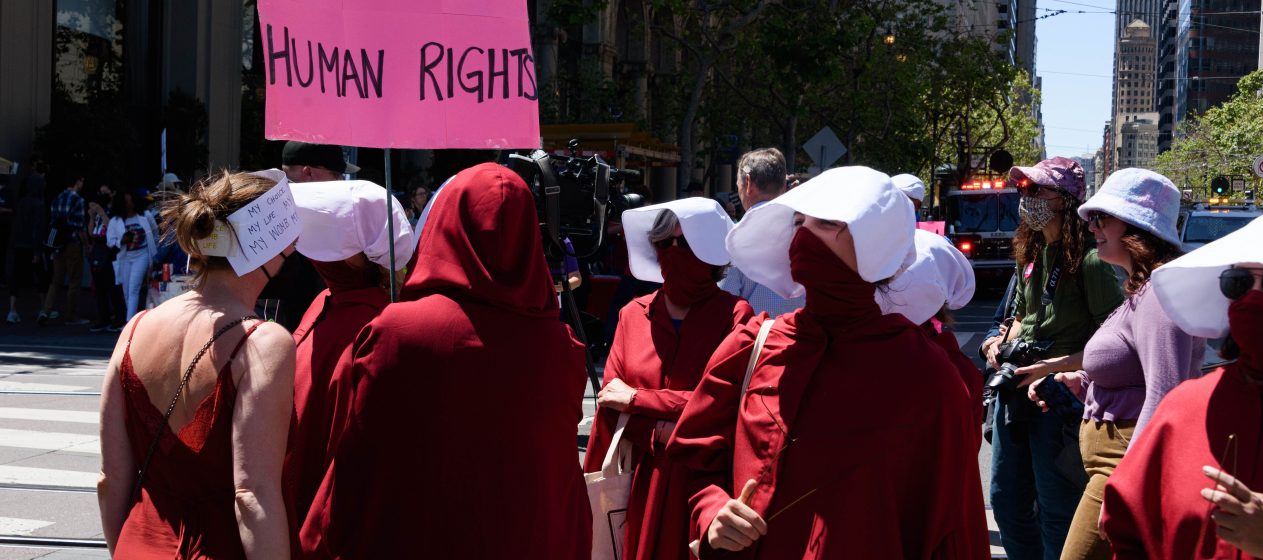In the context of the U.S. Supreme Court repeal of Roe v. Wade, the struggle for access to abortion and reproductive freedom continues. In Germany, abortion remains a criminal act only granted under specific conditions and requirements. Apart from ethical and legal requirements, abortions are hardly mentioned in most medical curricula. There is a shortage of medical practices that perform abortions, especially in rural areas and if there is no “medical or criminological indication”, the procedure is not covered by health insurance, costing between €300 to €600. §218 of the criminal code that criminalises and regulates abortion is a remnant from the imperial penal code of 1871 (only the GDR legalised abortion in 1972).
Radical feminists in Germany were at the forefront of criticising levels of access to contraception and abortion around the turn of the 20th century. Reproduction, population politics, and by extension, “women’s bodies”, became contentious public issues in Germany and beyond amongst falling birth rates and changing social structures due to industrialisation, colonisation, and wars.
The radical claims by feminists around the Bund für Mutterschutz und Sexualreform (League for the Protection of Mothers and Sexual Reform, BfM), occupied a unique space within the so-called first wave of feminism in Europe. They advocated far-reaching demands regarding women’s right to self-ownership over their bodies and sexuality. This included the abolition of §218. The “new ethics“ strived for a freer sexuality and the emancipation of (bourgeois) women in the face of social double standards and to the “upliftment of the race“ (Dietrich 2009, 12). They utilised arguments of individual control and ownership whilst stressing women’s responsibility to the nation, the “quality of the population” and the “new generation”. Uncompromisingly, at the center of the work of the BfM was the “right to motherhood” and “right and duty to reject motherhood under unfavourable circumstances” (Stöcker 1910, 415). However, “duty” does some weighty and far-reaching work for them.
Arguments for a woman’s right to her own body developed in the context of a rising eugenic discourse. In fact, the BfM were notorious for a specific kind of “synthesis of eugenics and sexual radicalism” (Allen 1985, 480). Stressing maternal responsibility for the race lent more collective weight to individual claims of rights or ownership. They argued that only through sexual freedom, economic self-sufficiency and bodily autonomy could maternal responsibility foster and provide quality of offspring for the future of the race (Stöcker 1981, 150). Whilst other contentious areas, such as education, suffrage or property ownership were argued for as formal equality with men, the same thing was not possible for issues of reproduction and sexuality. Tactically, eugenics supported political demands by lending them supposed scientific legitimacy, but it wasn’t long before strategy became ideology.
Radical feminist and sex reformers developed their own eugenic thoughts. It became “a new basis for a challenge to male authority within marriage”, for new concepts of motherhood and a reform of the family (Allen 1985, 484). Suddenly, the right to motherhood was conditional rather than absolute. The “duty”, not just right, to reject motherhood on the grounds of improving the population (and with it, the German race), led to arguments suggesting that children of “parents afflicted by contagious diseases, heart disease, or insanity should not be born.”(Frederiksen 1981, 22). Through this lens, your body “belonged to you” depending on who “you” were.
Whilst this form of “social hygiene” did not make explicit claims about the right properties of a white race, the implicit assumptions were clear. Consider the BfM’s involvement in the interracial marriage debates surrounding German settlements in colonial properties such as German Southwest Africa (today Namibia). “Racial mixing” and its threat to white settler and colonial state interests was a contentious issue not just in the colonies. The BfM criticised the mainstream debate’s focus on marriage regulation. But far from criticising the foundation of the debate as such, they only took issue with the ineffectiveness (“wrong tool”) of legal prohibitions of marriage (Iros 1912, 317). Accepting “racial mixing” as a problem, they saw the solution in a fundamental change in sexual morals, which would create a sense of generative responsibility among white men in both the German Reich and the colonies. The BfM posited the emancipation of the white (bourgeois) woman as the best bulwark against the threat of “racial mixing”, as bettering the social position of white women would heighten and tighten racial pride (Canning 2002, 211). Furthermore, they argued for the proliferation of contraception to uphold racial purity in the face of “continuous sexual contact”. Once more, arguments pertaining to sexual emancipation and reproductive control were entangled with racialised, and racist, notions of the proper composition of a people.
I would argue with this historical perspective in mind, individual claims to rights and ownership remain fragile without some form of stabilising material and political-ethical order of how property and propriety are organised. The specific historical view of the fight for abortion challenges the dominance of the liberal rights doctrine for feminist struggle: reproductive choice based on healthy and responsible bodily ownership became an exclusive individual privilege, one that only “healthy”, “responsible”, and “proper” women could access. To be granted ownership and reproductive rights, your subjecthood had to adhere to specific notions of health and responsibility. Self-ownership for some; implied dispossession for others.
Black and Indigenous feminists have oriented their organising and thinking around this problem, arguing that the rhetoric of choice is necessary but not sufficient and constructing a framework of reproductive justice (e.g. see the SisterSong collective; Ross, 2006). By drawing on the work of grassroots organisations working in marginalised and racialised communities, we bear witness to the crucial rhetorical and organisational shift from choice and ownership, from slogans such as “safe, legal and rare”, to a healthcare framing of abortion as “safe, free and on demand”(Lewis, 2022).
The slogans “My Body My Choice”, or “My Body Belongs to Me”, are no longer reserved for feminist movements for reproductive justice, bodily self-determination, and abortion rights. In 2021, we witnessed anti-mask and anti-vax protestors appropriate the slogan to refuse protective covid-measures and abdicate collective responsibility vis-a-vis the broader community. At the same time, bodies originally centred by this political assertion are under attack in a roll-back of already precarious rights for gestators, mothers as well as queer and trans people.
Today, amidst discussions around falling birth rates and white fascist panics around the purported “great replacement” of innocent (white) children, it is as important as ever to scrutinise how to work towards reproductive freedom for all. Even without this historical excursion, the description of the current situation in Germany alone would warrant a rejection of a singular focus on choice or ownership. The right to choose remains insufficient at best if it is unaffordable and unavailable, especially if it isn’t accompanied by further reproductive care.
Bibliography:
Allen, Ann Taylor. 1985. “Mothers of the New Generation: Adele Schreiber, Helene Stöcker, and the Evolution of a German Idea of Motherhood, 1900-1914.” Signs 10(3): 418–38.
Canning, Kathleen. 2002. Languages of Labor and Gender: Female Factory Work in Germany, 1850-1914. original edition 1996 Cornell University. Michigan: University of Michigan Press.
Dietrich, Anette. 2009. “Sittlichkeit Zwischen Weiblicher Emanzipation Und ‘Hebung Der Rasse.’” Ariadne : Forum für Frauen- und Geschlechtergeschichte 55: 12–17.
Frederiksen, Elke. 1981. “Einleitung: Zum Problem Der Frauenfrage Um Die Jahrhundertwende.” In Die Frauenfrage in Deutschland 1865-1915: Texte Und Dokumente, Stuttgart: Reclam, 5–43.
Iros. 1912. “Koloniale Sexualpolitik.” Neue Generation 8(6).
Lewis, Sophie. 2022. “Free Anthrogenesis: Antiwork Abortion.” Salvage. https://salvage.zone/free-anthrogenesis-antiwork-abortion/ (June 21, 2022).
Ross, Loretta. “Understanding Reproductive Justice: Transforming the Pro-Choice
Movement.” Off Our Backs, vol. 36, no. 4, 2006, pp. 14–19.
Stöcker, Helene. 1910. “Der Internationale Neumalthusianer-Kongress in Haag.” Die Neue Generation: 415.
———. 1981. “Ehe Und Sexualreform.” In Die Frauenfrage in Deutschland 1865-1915: Texte Und Dokumente, ed. Elke Frederiksen. Stuttgart: Reclam, 148–68.







